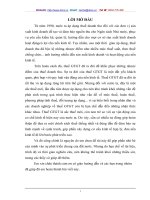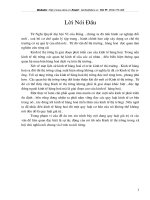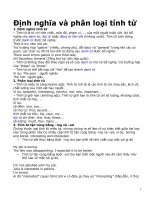Tân ngữ (complement / object) và các vấn đề liên quan –phần 2 pdf
Bạn đang xem bản rút gọn của tài liệu. Xem và tải ngay bản đầy đủ của tài liệu tại đây (136.61 KB, 6 trang )
Tân ngữ (complement / object) và các vấn
đề liên quan –phần 2
6.1.5.3 Noun + preposition + verb-ing:
Noun + prepositions + V
-
ing
choice of
excuse for
intention of
method for
possibility of
reason for
(method of)
There is no reason for leaving this early.
George has no excuse for droping out of school.
There is a possibility of acquiring this property at a good price.
He has developed a method for evaluating this problem.
Các trường hợp khác:
Trong các trường hợp khác, động từ đi sau giới từ cũng phải ở
dạng verb-ing.
After leaving the party, he drove home.
He should have stayed in New York instead of moving to Maine.
6.1.6 Động từ đi sau tính từ:
Nói chung, nếu động từ đi ngay sau tính từ (không có giới từ) thì
được dùng ở dạng nguyên thể. Những tính từ đó bao gồm.
anxious
boring
dangerous
hard
eager
easy
good
strange
pleased
prepared
ready
able
usual
common
difficult
It is dangerous to drive in this weather.
Mike is anxious to see his family.
We are ready to leave now.
It is difficult to pass this test.
Chú ý: able và capable có nghĩa như nhau nhưng cách dùng
khác nhau:
(able/ unable) to do smt = (capable/ incapable) of doing smt.
6.2 Đại từ đứng trước động từ nguyên thể hoặc V-ing trong
tân ngữ
6.2.1 Trường hợp tân ngữ là động từ nguyên thể
Trong trường hợp tân ngữ là động từ nguyên thể (loại 1) thì bất
cứ danh từ hay đại từ nào trực tiếp đứng trước nó cũng phải ở
dạng tân ngữ (complement form).
Joe asked her to call him.
S + V + {pronoun/ noun in complement
form} + [to + verb]
Sau đây là một số động từ đòi hỏi tân ngữ là một động từ nguyên
thể có đại từ làm tân ngữ gián tiếp.
allow
ask
beg
convince
expect
instruct
invite
order
permit
persuade
prepare
promise
remind
urge
want
We ordered him to appear in court.
I urge you to reconsider your decision.
They were trying to persuade him to change his mind.
The teacher permitted them to turn their assignments in late.
You should prepare your son to take this examination.
6.2.2 Trường hợp tân ngữ là V-ing
Trong trường hợp tân ngữ là một V- ing thì đại từ/danh từ phải ở
dạng sở hữu.
Subject + verb + {pronoun/
noun}(possessive form) + verb-ing
We understand your not being able to stay longer.
We object to their calling at this hour.
He regrets her leaving.
We are looking forward to their coming next year.
We don’t approve of John’s buying this house.
We resent the teacher’s not announcing the test sooner.









